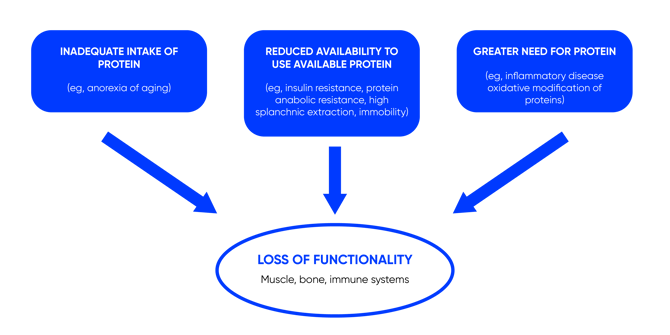NUTRITION CHALLENGES FOR AGING: THE IMPACT OF PROTEIN ON SATIETY AND ENERGY INTAKE
Posted by Daniel Crabtree, PhD on May 16, 2022 9:35:14 AM

The process of aging causes multiple physiological, psychological and social changes that affect food choice and consumption. Advancing age alters food reward signals, reduces food craving behavior, and suppresses appetite and energy intake, all of which contribute to a condition termed the “anorexia of ageing”. Compared with younger adults, older adults are reported to consume approximately 30% less energy per day. Dietary diversity (the number of different foods or food groups consumed over a given reference period) is also attenuated with ageing, with lower consumption of protein reported in older populations. Inadequate regulation of food and protein intake increases the risk of developing conditions such as sarcopenia and osteoporosis. Therefore, protein-energy homeostasis is considered a fundamental dietary-related determinant of healthy aging.

Dietary protein requirements increase with age, attributed partly to an increase in anabolic resistance to muscle protein synthesis (MPS), which accelerates loss of skeletal muscle mass and function. Maintaining muscle mass is essential to protect against falls, which are a leading cause of injury-related mortality in older people and a consequence of anorexia of ageing.
Despite the highly satiating effects of protein, interestingly, evidence suggests that older adults exhibit a blunted satiety response to protein consumption compared with younger adults. In fact, whey protein drinks have been shown to increase short-term total daily energy and protein intake in older people, even when the protein content of the drinks is very high. Another promising strategy for promoting energy and protein consumption in later life is the fortification of foods with protein. Increasing food volume to meet energy requirements is often unachievable in older groups, therefore, increasing energy and protein density while not affecting or reducing portion size, would be beneficial. As it is frequently reported that older adults consume inadequate amounts of protein, supplementing a healthy diet with additional high-quality protein may sufficiently stimulate MPS, without adversely affecting habitual appetite and food intake. However, further studies investigating compliance with long-term protein supplementation and the effects on satiety and energy intake are warranted.
With the global population ageing (current UN projections expect 1.5 billion people over the age of 65 by 2050), innovative strategies to support protein-energy homeostasis are essential. Adopting a co-production approach involving academia, industry, practitioners and members of the public may stimulate the design of effective nutritional interventions, which consider age-related changes in physiology, cognition and lifestyle that affect appetite and dietary needs and preferences.
Further references and reading:
Bauer, J., Biolo, G., Cederholm, T., Cesari, M., Cruz-Jentoft, A.J., Morley, J.E., Phillips, S., Sieber, C., Stehle, P., Teta, D. and Visvanathan, R., 2013. Evidence-based recommendations for optimal dietary protein intake in older people: a position paper from the PROT-AGE Study Group. Journal of the American Medical Directors association, 14(8), pp.542-559.
Dent, E., Hoogendijk, E.O. and Wright, O.R., 2019. New insights into the anorexia of ageing: from prevention to treatment. Current Opinion in Clinical Nutrition & Metabolic Care, 22(1), pp.44-51.
Lonnie, M., Hooker, E., Brunstrom, J.M., Corfe, B.M., Green, M.A., Watson, A.W., Williams, E.A., Stevenson, E.J., Penson, S. and Johnstone, A.M., 2018. Protein for life: Review of optimal protein intake, sustainable dietary sources and the effect on appetite in ageing adults. Nutrients, 10(3), p.360.
Morley, J.E., 1997. Anorexia of aging: physiologic and pathologic. The American journal of clinical nutrition, 66(4), pp.760-773.
Nishimura, Y., Højfeldt, G., Breen, L., Tetens, I. and Holm, L., 2021. Dietary protein requirements and recommendations for healthy older adults–A critical narrative review of the scientific evidence. Nutrition research reviews, pp.1-48.
Topics: HUMAN NUTRITION
